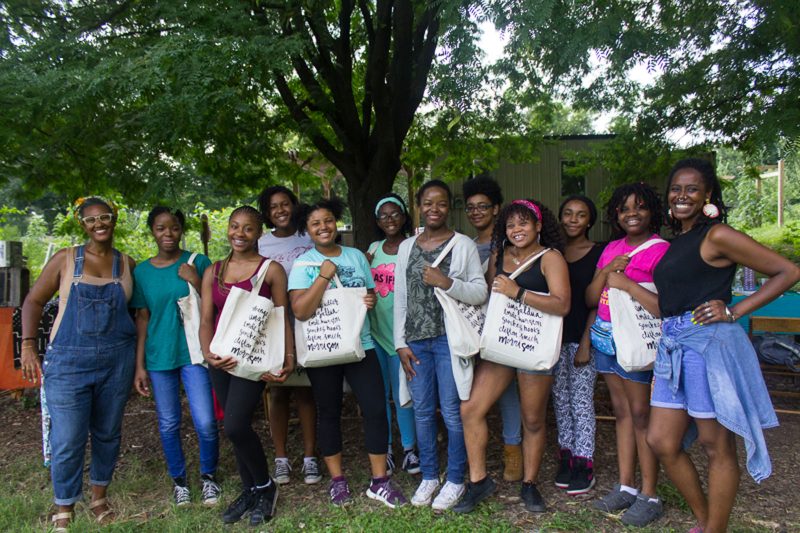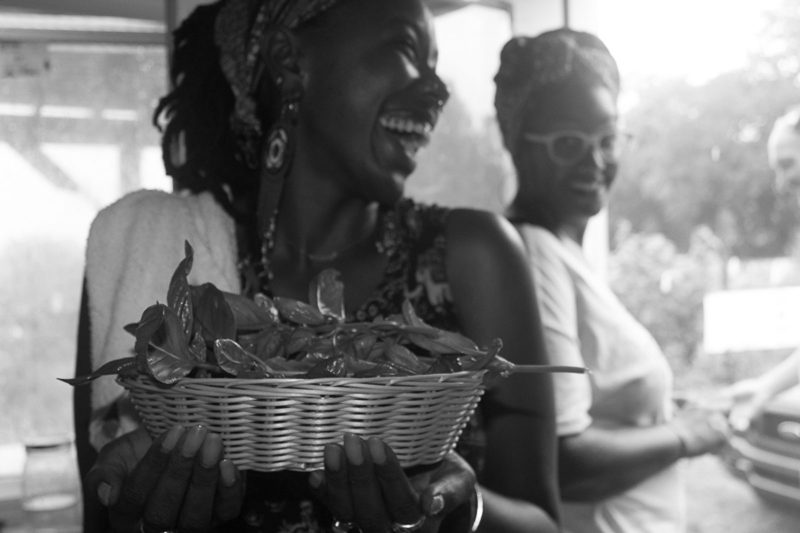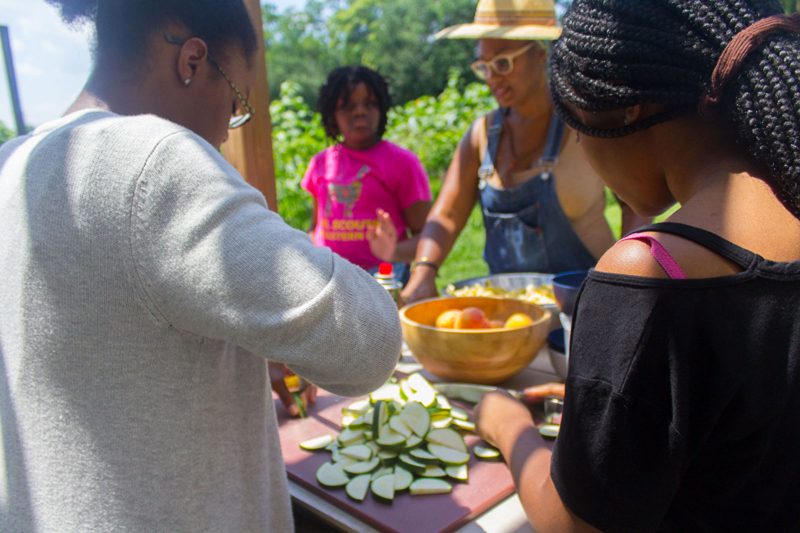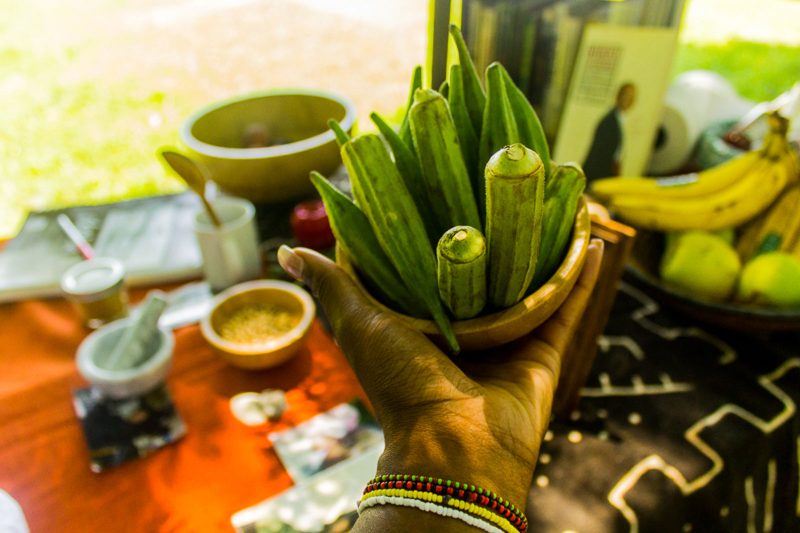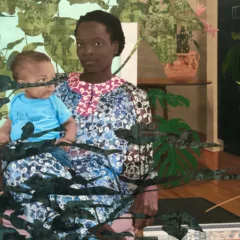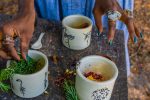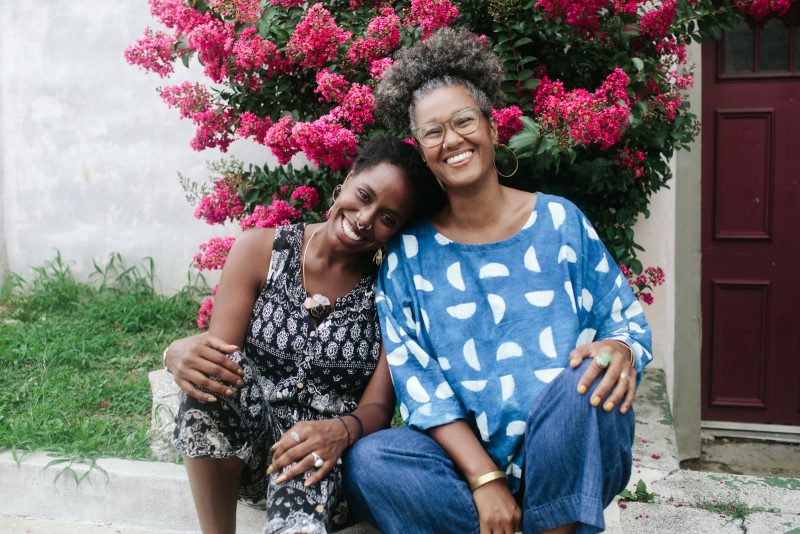
Last month, at Duafe Hair Salon, I attended a Zora Neale Hurston interactive community dinner hosted by Our Mothers’ Kitchens (OMK). Recently, I chatted with OMK founders, Shivon Love and Khaliah D. Pitts at Rittenhouse Barnes and Noble Bookstore to discuss their culinary + literature project. Our conversation highlighted four exceptional black women authors, and the importance of teaching young black girls to value themselves and where their food comes from.
Janyce Denise Glasper: How did you two meet?
Shivon Love: We were both working together at the Urban Nutrition Initiative teaching kids about nutrition in West Philadelphia.
JDG: Did the two of you decide to start Our Mothers’ Kitchens from there?
SL: Well, we felt a connection to the young people who had similar life experiences to us, and what we were required to teach didn’t align with our personal beliefs, our values, our knowledge.
Khaliah D. Pitts: It wasn’t healthy. There are other ways to deliver actual health education.
SL: It was rooted in pathology and wasn’t culturally responsive. We started doing our own thing. First, independently. Together, we created lessons that aligned with our cultural heritage and the lives that the young people were living without making assumptions. They responded well.
JDG: How did you know that you wanted to combine literary + culinary together?
KDP: Separately, I was working on merging my obsession with food and my natural art of writing, putting together a book. One day, Shivon and I were hanging out as girlfriends, and she also had an idea about joining both worlds.
SL: Well, I’m not a writer. I enjoy the history of food, particularly that of black folks. I read a lot of that and wove my learnings into my teachings. Our Mothers’ Kitchens is built on the foundation of four black women writers: Alice Walker, Ntozake Shange, Zora Neale Hurston, and Vertamae Grosvenor. Vertamae was the seed for this project. She was an untrained writer and a part of the Black Arts Movement. Her cookbook, “Vibration Cooking: The Traveling Notes of the Geechee Girl,” was in line with how black people shared experiences through stories, histories, and recipes. This book is a colloquial oral history and familiar like the kitchen conversations with your nana, auntie, or mama. It needed to be brought out of the 1970’s to present day. Vertamae would grapple her place in activism. Someone told her, ‘Food, that’s how.’ That is just as important as any other type of activism. That’s what resonated with me.
KDP: Shivon introduced me to Vertamae’s book and suggested that we marry literature and food, going beyond physical health, to look at the social health of the black community. We started focusing on little black girls because we were little black girls. So, we wanted to highlight black female writers. Vertamae was obvious. Ntozake fell in with “if i can cook, i know god can.” Zora came about because she is frequently mentioned by every other woman. Alice’s “In Search of Our Mother’s Garden” essay resonated with me. I love the dinners so much because all of the little stuff that goes into it is art.
JDG: How is each dinner different? Are you two involved in the planning of the menus?
SL: We do everything. We try to use these spaces to bring in other black women that we know who can contribute to the work, other black female chefs. We usually plan the menu or give basic minimals for the chefs to step into their artistry.
KDP: Zora wasn’t a food writer, but she had many recipes in her novels. We give the chefs the bare bones of a recipe and ask them to put their spin on it. But we prepare part of the menu as well. We always cook something.
SL: The menus are inspired by the writing. Each author is different. We don’t take their meat-heavy recipes directly. The dinners are plant-based. We use ingredients that are fresh, local, and seasonal. Dishes are inspired by where the authors are from. We research their origins so that it’s more thematic than just actual quotes from their books.
JDG: In the dinners, what is the importance behind the altar, of bringing items from the home to honor these four women?
SL: It’s the way we hold memory. Food is an integral part of our lives. Our work is influenced by ancestors– whether they’re from our bloodline or not– being able to bring them into the space. I bring black eyed peas for Vertamae and for every Black person who has ever cooked a pot of black eyed peas.
KDP: An altar is a chance to realize your own story within and share that with the community.
JDG: The project was a recipient of a Leeway Foundation Grant. How has that shaped the Our Mothers’ Kitchens?
KDP: The Leeway Foundation Grant was what allowed us to pilot the camp for teen girls at Sankofa Community Farm. When we applied for the A Blade of Grass Fellowship, which funded the dinners, we focused on making a bumped up camp experience and introducing adult programming. The dinners allows us time to focus and learn about each woman. We love the dinners, but we really try to focus on inspiring and building our youth. We hand these little girls books and say, “Go, go read, go write! Do whatever you want! Go cook. Be black, be free.”
SL: The process has been very fulfilling. Camp is the hardest. It’s intense.
KDP: It’s very rewarding.
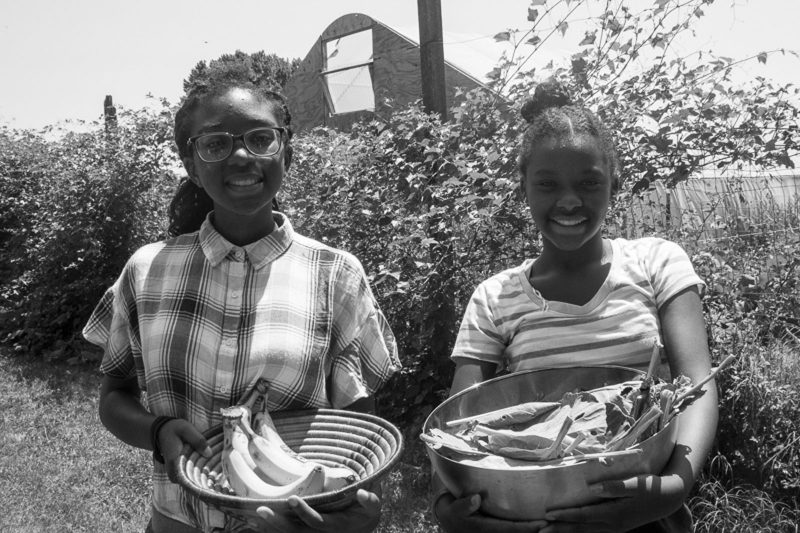
JDG: What do the girls do in this camp?
KDP: It’s similar to the dinners. They cook and eat and read and write.
SL: The dinners are influenced by the camp. It’s three days long and each day focuses foods found throughout the Black Diaspora.
KDP: We teach this diasporic “kitchen trifecta.” The first day is rice and beans. The second day is greens. The third day is herbs and spices.
SL: Each day, there is writing, reading, and cooking tied into that theme. At Sankofa Community Farm, we use that space to talk about the history of the land, indigenous peoples, the urban agriculture, and have the girls harvest the greens we cook.
KDP: Most folks, especially Black folks don’t get the chance to be a part of their food from start to finish. At camp, the girls experience this almost from the very beginning all the way to the end. That helps to shape their ideas about what food is, what the food system is, and creates new thoughts about their lives and how it could be different.
JDG: What is next after the Vertamae dinner next month?
KDP: Sleep.
SL: (laughs) Until August.
JDG: Any wonderful words of wisdom that Our Mothers’ Kitchens would like to close our conversation?
KDP: It is important for black folks to tell our own stories, in our own voices, in our own time, and to do so in a multitude of ways. Yes, we’re focused on the culinary and the literature. But, throughout this project we try to empower each bit of creativity and method of storytelling.
To learn more about Our Mothers’ Kitchens, visit their website at ourmotherskitchens.org and their instagram at @our_mothers_kitchens. The final dinner in the “In Search of Our Foremothers’ Kitchens” series celebrates Vertamae Grosvenor and is set for April 7, 2019 with location to be announced. The tickets are on a sliding scale of $35, $45, and $55. Our Mothers’ Kitchens also has a Summer Camp for Black girls, ages 12-17 years old at Sankofa Community Farm, June 28-30.
More Photos
